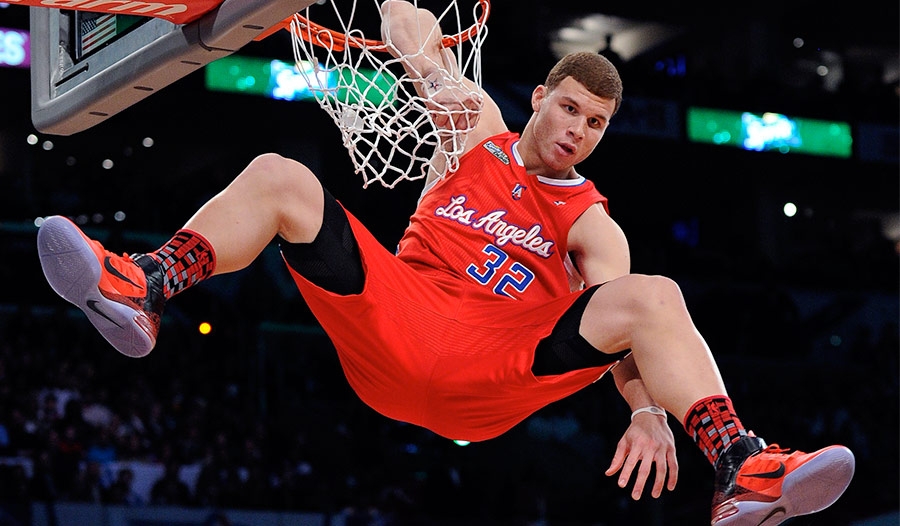
Will Marijuana Become the Next Sports Medicine?
In a recent interview with Rolling Stone, Los Angeles Clippers forward Blake Griffin summed up the growing support for the use of medical marijuana as a pain management tool in professional sports in simple terms. “It doesn’t really affect me, but so many guys would probably benefit from it, and not take painkillers, which have worse long-term effects,” said the 25-year-old All-Star. “So I would vote yes. I just think it makes sense.”
Griffin isn’t the first athlete to voice this opinion: in the last year, former Denver Broncos tight-end Nate Jackson has spoken of the positive impact of pot use to regulate the extraordinary amount of pain he endured during his tenure in the National Football League, while a host of other sports figures, from veteran wide-receiver Randy Moss to Olympic swimming champion Michael Phelps and wrestling superstar Rob Van Dam, have either admitted to marijuana use, or testified to the media about its efficacy as a pain medication and stress reliever. Even NFL commissioner Roger Goodell has expressed willingness to “follow the medicine” in regard to marijuana use for medicinal purposes.
With public support for the legalization of pot and use of medicinal marijuana now passing the 50% mark among Americans, is it possible that the NFL, Major League Baseball and the National Basketball Association may embrace the drug as the sports medicine of the 21st century? Unfortunately, the answer is also neatly summarized in a statement from Goodell: “I don’t see any change in the near future.”
There are volumes of research regarding the efficacy of marijuana as treatment for numerous sports-related injuries, from basic chronic pain to the devastating symptoms associated with concussions and even issues of stress and fear which can affect crucial decision making in a game. Such positive attributes take on even greater significance when weighed against the toll taken on players by the widespread reliance on opioid painkillers by team and league doctors.
A 2011 survey of 644 former NFL players by ESPN and researchers from the Washington University School of Medicine in St. Louis revealed an alarming statistic: 52% of the players polled said that they used prescription medication while playing the game, with 71% of those individuals admitting that they misused the drugs at the time. A further 15% admitted that they had misused medication within the last 30 days. Figures like these, as well as incidents of death or severe debilitation due to painkillers (such as New York Rangers left-winger Derek Boogard, who succumbed to an overdose of pills and alcohol) underscore the fact that the prescription drug problem within the sports industry is approaching the same epidemic level of addiction and overdose that plagues the general population.
Why, then, does professional sports continue to turn a blind eye towards medical marijuana? Two reasons: public opinion and fear. In a recent poll by HBO Real Sports and the Marist Poll, six in ten Americans stated that marijuana should continue to be banned from professional sports, even in states where the drug has become legal. Those polled cited the high standards by which athletes should be regarded as the key factor for their response. “Smoking marijuana, even if legal, would likely shatter the image of excellence we demand from our sports heroes,” said Dr. Keith Strudler, Director of the Marist College Center for Sports Communication.
Old taboos regarding the level of impairment caused by a marijuana high have also colored the industry’s attitude. As Denver Broncos defensive tackle Terrance Knighton noted, “We make a lot of money to perform at a high level, so if guys were coming into the locker room stoned out of their [minds], they won’t perform at a high level. There has to be some governing.” Knighton’s comments also highlight a significant factor that fuels the leagues’ negative reaction towards marijuana use: the possibility of lost income due to the drug’s supposed detrimental effect on players’ health.
Though prescription drugs have been proved to have disastrous long-term effects on players, the industry understands that this approach has kept their teams on the field in the short term, while marijuana remains an unknowable. However, the result is a shortsightedness that, as author Paul Solotaroff has written in regard to the NFL, has made professional sports “[close] its eyes to medical malpractice by many of its doctors and trainers. It does so not because it lacks the will to police its staff and players, but because the game itself could not survive without these powerful drugs.”
Sadly, a prevailing attitude such as that will yield as many tragedies – like Derek Boogard – as it will produce championship rings.




